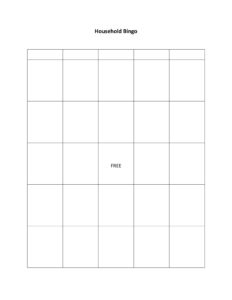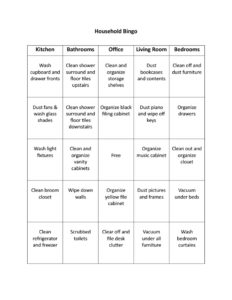 Anne Murdock just retired from decades of working with special needs children. That is our big link, as I have a special needs granddaughter. We met in church and became fast friends. Although I moved, we have stayed in touch. Recently we began meeting for lunch. We each drive about 30 minutes and it has been fun.
Anne Murdock just retired from decades of working with special needs children. That is our big link, as I have a special needs granddaughter. We met in church and became fast friends. Although I moved, we have stayed in touch. Recently we began meeting for lunch. We each drive about 30 minutes and it has been fun.
A few months ago, we discussed a cool system Anne uses to help women stay on top of their work at home and have fewer moments of feeling like they can’t manage. It’s called Household Bingo. You check off the boxes as you finish jobs until you have a bingo. Take time to reward yourself, read a book, take a walk, listen to music, etc. Then you work for the next bingo. Eventually, you will have crossed everything off the card. Then you create a new card by asking the question, “What is most pressing right now?” Sounds interesting, doesn’t it!
It is a simple system using the principle that small things, done consistently, make big things happen.
 The first image is the template for the game. Looks like a bingo game, right. : ) Anne has given several printed grids to friends who then write 20-minute tasks in the boxes.
The first image is the template for the game. Looks like a bingo game, right. : ) Anne has given several printed grids to friends who then write 20-minute tasks in the boxes.
The second image is the card Anne is currently working on.
These are “bigger” tasks, maybe more than 20 minutes. She designed this card with ‘things that are bugging me’ in mind.
“bigger” tasks, maybe more than 20 minutes. She designed this card with ‘things that are bugging me’ in mind.
Occasionally you will be called to work on something that isn’t on your card. You still make it count! When Anne accomplishes something big that is not on her card, she turns it over, writes the item on the back, and crosses it off. When she has 5 items crossed off on the back, she treats herself to some personal time. Don’t you love that! I know I do.
This is basically how it works. There are options so you can experiment. : )
You write rooms you want to keep up or a space you want to conquer across the top. Of course, there is a free square because we all need a free moment. Then in each square, you write down jobs that will take 10-20 minutes to accomplish. You give the room or space 20 minutes a day. If your card is for spaces you want to conquer then you list steps you can take to get the whole job done, over time, that require 20 minutes.
If we use our card to maintain, the goal is to keep the room in order, so we don’t become overwhelmed as things pile up. If we use the card to conquer a space, the goal is to get it in order over time. And it always takes time because these spaces are usually very out of order. You know, spaces like the garage, the laundry room, the storage room, and so forth.
I asked Anne to give me some examples of jobs she puts in the squares when she is working to maintain a clean home. She said that she usually has a row called COMMON AREAS. These are hallways, foyers, living room, etc. One 20-minute job she has in this row is ‘dust all the windowsills’. She writes the things that constantly get put on the back burner so that we can get to the next meal or meeting, but that bug you when they don’t get done.
Another example she gave was in the BEDROOM row – ‘Organize two drawers’, or ‘clean the upper shelf in the closet’, or ‘organize the clothes that hang in the closet’. These are the types of jobs that we close the door on and over time wonder why we are in such a mess!
An example of a 20-minute chore she gave for the BATHROOM was ‘really clean the floor’ or ‘spray and wipe down the shower’. Again those chores we close the door on until they are so grungy we must do them. But in the meantime, they are an emotional weight we carry.
Here is an example from her “conquer a space” chart. She has a storage room as most of us do. In this room, she has six free-standing sets of shelves. In one of her squares, it says to clean two shelves in one set of shelves. The goal is to clean them all in a week or maybe a month, depending on how much organizing is required. You get to set the timeline. If it is a job that can be done in a week great. If not, then you give yourself 20 minutes a day for a month. Whatever it takes. But over time the storage room is in order, and it stays in order.
Anne shared some experiences she and her friends have had, and I think you will find them interesting.
Success Stories
Story 1: Anne got herself some quilt squares a few months ago. When I called her today to have her explain some of the fine points of Household Bingo, she proudly told me she finally finished one square. How did she finally do that? She put it on her Bingo Card. Then she broke down the steps that needed to happen. First, she had to get the correct type of ruler. This had been holding her up. You see, this game can work on any project that is holding you hostage. : )
Story 2: Anne has a friend who is a bit of a hoarder. She has a space in her basement she has dubbed the dungeon or the pit. She has collected a lifetime of stuff from her parents and numerous moves. She recently told Anne, “I haven’t gotten very far but I give myself a star for every 20 minutes I spend. So far, I have 20 stars and I am making a dent.” She has been able to work on the stuff she has from her mom, her dad, and her collection of fabrics. It feels good!
Story 3: This same woman has an older, special needs daughter. Her capacity is around age 9 or 10. Her room was driving her parents nuts. So, they taught her to play Household Bingo. With repetition, her room is now in order, and she can keep it in order, in just 20 minutes a day. Her parents are relieved, and she is happy.
Story 4: Anne has a friend with children in elementary school, middle school, high school, and college. The children were struggling to do daily chores. Charts were made based on age, one for the elementary kids and one for the teens. Each child selected a chore each day on the bingo chart. The children marked the chart using their initials/color marker to indicate it was complete. When the child got a bingo, the reward was to take the next day chore-free. Getting 4-5 chores done daily 5 days a week made weekends more available for family fun.
Anne told me that the game can be very effective with children and 10-minute chores. As you can see the game is adaptable for ages and stages. Children are motivated to get a bingo when the reward is to not have the chore the next day or to spend 20 minutes with mom or dad doing an activity of their own choosing, playing a game, talking, making a treat, etc.
Story 5: Anne’s husband has an uncle who has a very large, immaculate yard. His family members are always telling him to slow down because they think he is spending hours keeping that huge yard in such amazing order. Recently he posted this on their family site – “You all keep saying I shouldn’t work so hard in my yard, but I don’t. I putter here and then I putter there. I give it a short amount of time and then I go in the house. I just consistently take small bites. I look to see what needs the most attention right now and then I do some of that. Then I go into the house.”
I don’t know how many times I used this phrase in my book Becoming a Present Parent – Small steps, taken consistently, bring BIG things to pass. This principle is true, and it can help you keep your home in order and clear out the spaces that make you feel powerless and unsuccessful. It can help your children manage themselves and their chores.
If you need a system and this one speaks to your heart, then engage in an experiment. It may be just the thing for you and your family.
P.S. Nothing works forever. Even good systems occasionally need to be revamped. That is important to keep in mind. It isn’t a failure, but time passes, and circumstances change.
Do another experiment. : )



 I have the wonderful privilege of having wise and dear friends. When we can be together, we talk about the things that cause us trouble and what we are doing to ease the way. The issues the mothers we work with come up. I make notes and I share our thoughts with you. Sometimes the thoughts get buried in life for a time and then reemerge.
I have the wonderful privilege of having wise and dear friends. When we can be together, we talk about the things that cause us trouble and what we are doing to ease the way. The issues the mothers we work with come up. I make notes and I share our thoughts with you. Sometimes the thoughts get buried in life for a time and then reemerge.